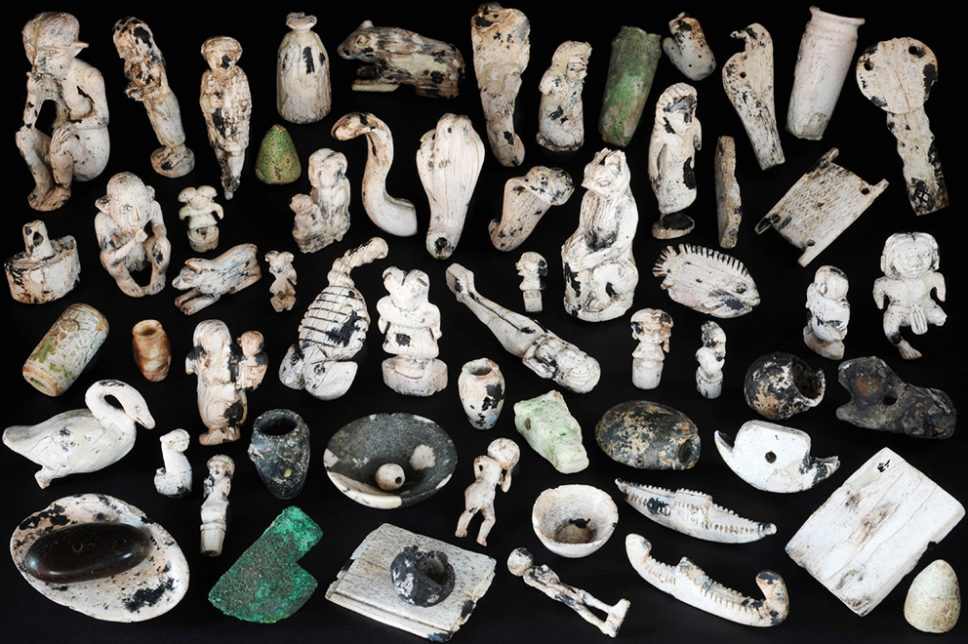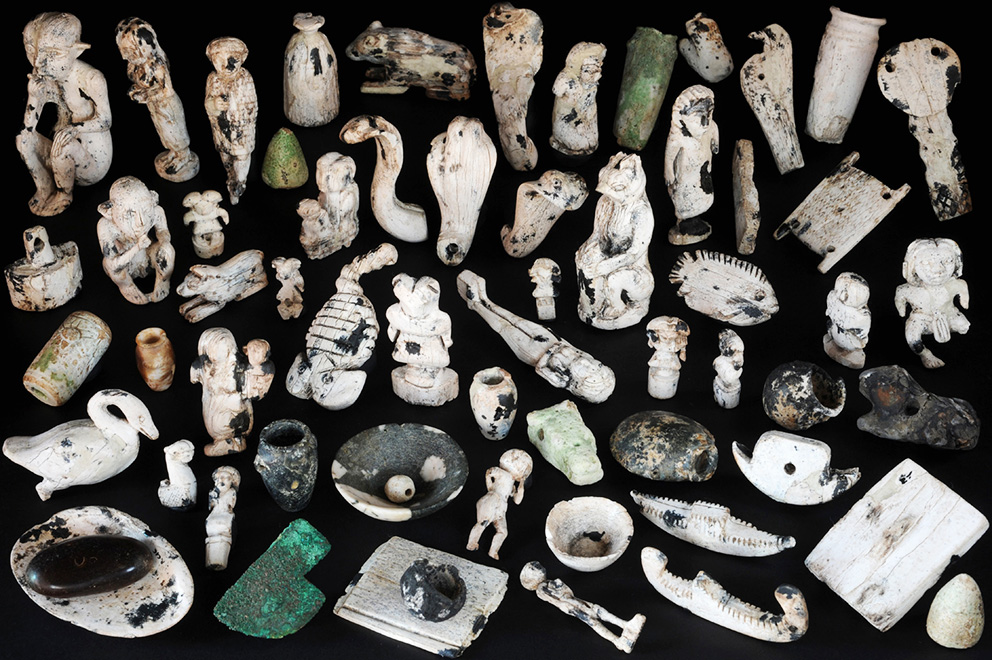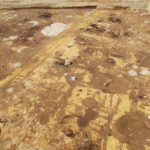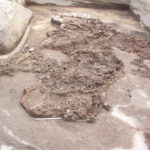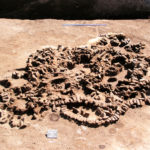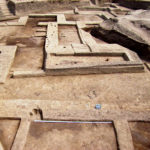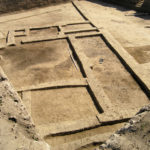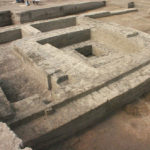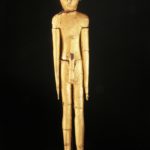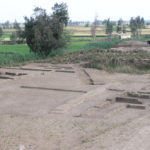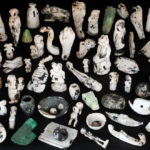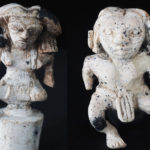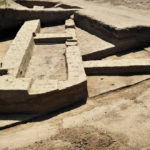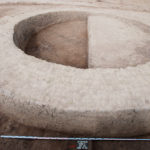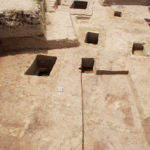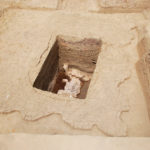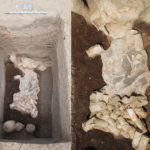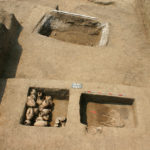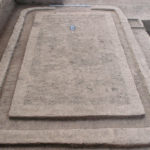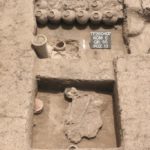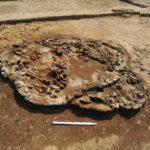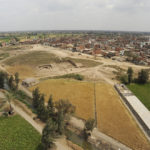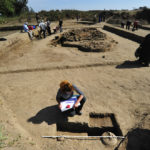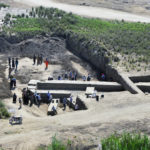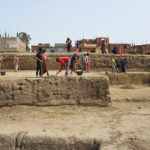Tell el-Farkha
Tell el-Farcha
Ghazala
-
Project name:
Polish Archaeological Expedition to the Eastern Nile Delta
Project site:
Facebook:
Polish Archaeological Expedition to the Eastern Nile Delta – Tell el-Farkha
-
Type of site:
Multicultural site: settlements, city, cemeteries
Location:
Egypt
Eastern Delta
Daqahliya ProvinceDating:
– Lower Egyptian culture; corresponding to the Naqada IIB–C period (about 3700–3500 BC)
– Naqada IID1–mid-IIIB period (about 3500–3200 BC)
– Protodynastic period (Naqada IIIB–IIIC1, 3200–3000 BC)
– Early Dynastic period (Naqada IIIC2–IIID; middle of the 1st–2nd dynasty, 3000–2700 BC)
– Old Kingdom (3rd–4th dynasty, 2700–2600 BC)
Most interesting finds:
– Lower Egyptian culture settlement divided into functional quarters (residential, representative, and economic)
– The oldest brewing center in Egypt (about 3700–3500 BC)
– The so-called Naqadian residence – the largest predynastic residential building known from Egypt (about 3500–3350 BC, Western Kom)
– Protodynastic settlement on the Central Kom
– The oldest Egyptian mastaba (about 3300–3200 BC; Eastern Kom)
– Two gold statues of men (57 and 30 cm high; dated to before 3200 BC)
– Proto- and Early Dynastic administrative and cult center (about 3200–3000 BC, Western Kom) and votive deposits discovered there: several dozen figurines, mostly of hippopotamus tusk
– Multi-room storage buildings on the Central Kom, contemporary with the Predynastic residence (phase 1) and the administrative and cult center (phase 2)
– Early Dynastic tower-silo
– 140 graves dated from the Naqada IIIB period to the 3rd dynasty
History of research:
Dates of mission’s work:
1998–
Type of research:
Excavations
Directors:
Marek Chłodnicki, Archaeological Museum in Poznań
Krzysztof Ciałowicz, Institute of Archeology, Jagiellonian University
Co-operating institutions:
– Institute of Archeology, Jagiellonian University
– Archaeological Museum in Poznań
– Polish Centre of Mediterranean Archaeology, University of Warsaw
– Patrimonium Foundation
– Silesian Museum in Katowice
– AGH University of Science and Technology
– Institute of Archaeology and Ethnology, Polish Academy of Sciences
– State Archaeological Museum in Warsaw
Additional information:
Excavations are conducted since 1998 by the Archaeological Museum in Poznań and the Institute of Archeology, Jagiellonian University, under the auspices of the Polish Centre of Mediterranean Archaeology, University of Warsaw.
National Science Centre grant, Opus 7: Assoc. Prof. Krzysztof M. Ciałowicz, “Social and political changes in the Eastern Nile Delta at the turn of the 4th and 3rd millennia BC (Jagiellonian University, Institute of Archeology)”.
Description of the site and research:
Tell el-Farkha is a multicultural site, encompassing a Predynastic settlement, Proto- and Early Dynastic city, as well as Protodynastic, Early Dynastic, and Old Kingdom cemeteries.
Seven main phases of the settlement were distinguished. The first phase is dated to the Lower Egyptian culture contemporary with the Naqada IIB–C period (about 3700–3500 BC). The next one is a transitional period between the Lower Egyptian and Naqadian cultures (Naqada IID1; about 3500–3450 BC). The beginning of southern Egyptian dominance is dated to the Naqada IID2–beginning of the IIIA1 period (about 3450–3350 BC). In the Naqada IIIA1–mid-IIIB period (3350–3200 BC), new settlers came from the south of the country, and trade with the Levant expanded. The next phase of the settlement dates to the Protodynastic (from the reign of Iry-Hor to the middle of the 1st dynasty; Naqada IIIB–IIIC1; 3200–3000 BC) and Early Dynastic period (Naqada IIIC2–IIID; middle of the 1st–2nd dynasty; 3000–2700 BC), when Tell el-Farkha lost its political significance but retained economic importance. In the Old Kingdom (3rd–4th dynasty; 2700–2600 BC), the settlement gradually fell into decline.
The research carried out in Tell el-Farkha significantly changed the opinions on the creation of the Egyptian state and the role played by the Delta in the formative period. Evidence of close relations with the Levant and Upper Egypt during the Lower Egyptian culture period was found. The name of this culture was introduced into the literature as a result of the excavations in Tell el-Farkha. Among the settlers who came to the site from Upper Egypt, at least three groups were distinguished, probably connected with different political centers. Tell el-Farkha was determined to have been an administrative and cult center of the Eastern Delta at the least. The research also showed that mastaba as a type of tomb first appeared in the Delta.
Research results:
Season by season – “PCMA Newsletter”:
- 2018 season
- 2017 season
- 2016 season
- 2015 season
- 2014 season
- 2013 season
- 2012 season
- 2011 season
- 2010 season
- 2009 season
- 2008 season
- 2007 season
- 2006 season
Other:
Spring 2006: Tell el-Farkha: Discovering a treasure of the early pharaohs
2013-06 Exhibition “15th anniversary of excavations at Tell el-Farkha”
Chłodnicki, M. & Ciałowicz, K. M. (2018) Tell el-Farkha: archaeological fieldwork 2016–2017. Polish Archaeology in the Mediterranean 27/1, 123–148
Chłodnicki, M. & Ciałowicz, K. M. (2016). Tell el-Farkha: Archaeological fieldwork 2014–2015. Polish Archaeology in the Mediterranean 25, 227–254.
Chłodnicki, M. & Ciałowicz, K. M. (2015). Tell el-Farkha. Excavations, 2012–2013. Polish Archaeology in the Mediterranean 24/1, 173–197.
Chłodnicki, M., Ciałowicz, K.M. & Mączyńska, A. (eds.), (2012). Tell el-Farkha I. Excavations 1998–2011, Poznań–Kraków.
Chłodnicki, M. & Ciałowicz, K. M. (2011). Tell el-Farkha (Ghazala), 2010–2011. Polish Archaeology in the Mediterranean 23/1, 117–140.
Chłodnicki, M., Ciałowicz, K.M. et al. (2010). Polish excavations at Tell el-Farkha (Ghazala) in the Nile Delta. Preliminary Report 2008–2010. Archeologia 61, 109–170.
Chłodnicki, M. & Ciałowicz, K. M. (2009). Tell el-Farkha (Ghazala). Season 2009. Polish Archaeology in the Mediterranean 21, 135–156.
Chłodnicki, M., Ciałowicz, K.M. et al. (2008). Polish excavations at Tell el-Farkha (Ghazala) in the Nile Delta. Preliminary Report 2006–2007. Archeologia 59, 81–151.
Chłodnicki, M. & Ciałowicz, K. M. (2008). Tell el-Farkha (Ghazala), 2008. Polish Archaeology in the Mediterranean 20, 153–170.
Chłodnicki, M. & Ciałowicz, K. M. (2007). Tell el-Farkha (Ghazala): Preliminary report, 2007. Polish Archaeology in the Mediterranean 19, 161–178.
Chłodnicki, M., Ciałowicz, K.M. et al. (2006). Polish excavations at Tell el-Farkha (Ghazala) in the Nile Delta. Preliminary Report 2004–2005. Archeologia 57, 71–128.
Chłodnicki, M. & Ciałowicz, K. M. (2006). Tell el-Farkha (Ghazala): Preliminary report, 2006. Polish Archaeology in the Mediterranean 18, 127–153.
Chłodnicki, M. & Ciałowicz, K. M. (2005). Tell el-Farkha (Ghazala): Season 2005. Polish Archaeology in the Mediterranean 17, 143–154.
Chłodnicki, M., Ciałowicz, K.M. et al. (2004). Polish excavations at Tell el-Farkha (Ghazala) in the Nile Delta. Preliminary Report 2002–2003. Archeologia 55, 47–74.
Chłodnicki, M. & Ciałowicz, K. M. (2004). Tell el-Farkha (Ghazala): Season 2004. Polish Archaeology in the Mediterranean 16, 131–145.
Chłodnicki, M. & Ciałowicz, K. M. (2003). Tell el-Farkha (Ghazala): Season 2003. Polish Archaeology in the Mediterranean 15, 101–109.
Chłodnicki, M., Ciałowicz, K.M. et al. (2002) Polish excavations at Tell el-Farkha (Ghazala) in the Nile Delta. Preliminary report 1998–2001. Archeologia 53, 63–118.
Chłodnicki, M. & Ciałowicz, K. M. (2002). Tell el-Farkha (Ghazala): Season 2002. Polish Archaeology in the Mediterranean 14, 99–109.
Chłodnicki, M. & Ciałowicz, K. M. et al. (2001). Tell el-Farkha (Ghazala): Season 2001. Polish Archaeology in the Mediterranean 13, 105–126
Chłodnicki, M. & Ciałowicz, K. M. (2000). Tell el-Farkha (Ghazala): Interim report, 2000. Polish Archaeology in the Mediterranean 12, 85–97.
Chłodnicki, M. & Ciałowicz, K. (1999). Tell el-Farkha (Ghazala): Explorations, 1999. Polish Archaeology in the Mediterranean 11, 59–76.
Chłodnicki, M. & Ciałowicz, K. (1998). Tell el-Farkha: Explorations, 1998. Polish Archaeology in the Mediterranean 10, 63–70.
Gallery:
-
1. Lower Egyptian settlement on the Central Kom / Osada dolnoegipska na Komie Centralnym (fot. R. Słaboński)
-
2. Lower Egyptian culture. Brewing center / Kultura Dolnoegipska. Centrum browarnicze (fot. R. Słaboński)
-
3. Lower Egyptian culture. One of the breweries / Kultura Dolnoegipska. Jeden z browarów (fot. R. Słaboński)
-
4. Part of the so-called Naqadian residence / Fragment tzw. rezydencji nagadyjskiej (fot. R. Słaboński)
-
5. Part of the Protodynastic settlement on the Central Kom / Fragment protodynastycznej osady z Komu Centralnego (fot. R. Słaboński)
-
6. The oldest Egyptian mastaba / Najstarsza egipska mastaba (fot. R. Słaboński)
-
7. The bigger of the gold statues from the Eastern Kom / Większa złota figura z Komu Wschodniego (fot. R. Słaboński)
-
8. Protodynastic administrative and cult center. Western part / Protodynastyczne centrum administracyjno-kultowe. Część zachodnia (fot. R. Słaboński)
-
9. Objects from a votive deposit. Western Kom / Przedmioty z depozytu wotywnego. Kom Zachodni (fot. R. Słaboński)
-
10. Depictions of dwarfs / Przedstawienia karłów (fot. R. Słaboński)
-
11. Storerooms on the Central Kom. Younger phase / Magazyny z Komu Centralnego. Młodsza faza (fot. R. Słaboński)
-
12. Early Dynastic silo on the Central Kom / Wczesnodynastyczny silos z Komu Centralnego (fot. R. Słaboński)
-
13. Part of the cemetery with excavated graves / Fragment cmentarzyska i wyeksplorowane groby (fot. R. Słaboński)
-
14. Burial chamber of a small mastaba dated to the Naqada IIIB period (Grave 100) / Komora grobowa datowanej na Nagada IIIB małej mastaby (grób nr 100) (fot. R. Słaboński)
-
15. Reconstruction of the superstructure of Grave 100 / Rekonstrukcja nadbudowy grobu nr 100 (wyk. K. Rosińska-Balik)
-
16. Grave 100. The deceased and furnishings / Grób nr 100. Zmarły i wyposażenie (fot. R. Słaboński)
-
17. View of Graves 9 and 50 / Widok na groby nr 9 i 50 (fot. R. Słaboński)
-
18. Superstructure of an Early Dynastic mastaba (Grave 55) / Nadbudowa wczesnodynastycznej mastaby (grób nr 55) (fot. R. Słaboński)
-
19. Burial chamber of Grave 55 / Komora grobowa grobu nr 55 (fot. R. Słaboński)
-
20. The youngest of the breweries discovered in Tell el-Farkha (Naqada IIIA). Western Kom / Najmłodszy z browarów odkrytych w Tell el-Farcha (Nagada IIIA). Kom Zachodni (fot. R. Słaboński)
-
21. General view of the site / Ogólny widok stanowiska (fot. R. Słaboński)
-
22. Work on the Western Kom / Prace na Komie Zachodnim (fot. R. Słaboński)
-
23. Work on the Central Kom / Prace na Komie Centralnym (fot. R. Słaboński)
-
24. Work on the Eastern Kom / Prace na Komie Wschodnim (fot. R. Słaboński)

